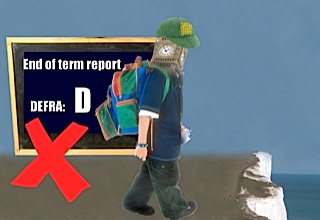“We want to tell consumers that 80% of the animals farmed in the EU each year are factory farmed,” says Emma Slawinski, senior campaigns manager of Compassion in World Farming (Compassion). Filthy Business is Compassion’s focus during the CAP reform debate.

Starting in earnest at the end of November, the campaign has a generic livestock message, which is a change from Compassion’s usual species focus. “It’s something that supporters are less used to,” concedes Slawinski, “but then the CAP is not a single-species issue, either.”
The lobbying target is the European Parliament: the NGO is specifically urging supporters to write to their local MEP. “We have supporters all over the world and we have offices opening across Europe,” adds Slawinski.
As the campaign progresses, Compassion will release a series of “filthy facts”, statistics such as the fact that there are 300 million broiler chickens intensively raised across the EU every year. These are bred to grow so big and so fast that they cannot support their own body weight properly. “The CAP reforms do nothing to support a move towards humane and sustainable farming,” Slawinski told ARC 2020.
The industrialisation of livestock has consequences for climate change, water quality and the environment. “If we are to tackle deforestation in South America, then removing an excuse for growing yet more soya beans as feed for intensively farmed animals is a good place to start.”.
This is one of the biggest external costs of intensive farming, which do not appear on corporate balance sheets. “The current set of reforms are a series of backward steps,” is the Compassion view.
The true cost of cheaply-priced food is not something that EU consumers always understand. A time when food production is on the political agenda is an opportunity not to be missed.





